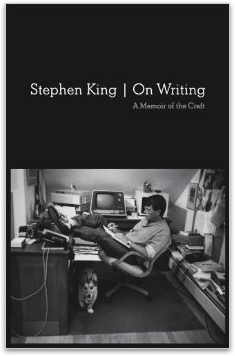On Writing
by Stephen King

Troy Shu
Updated at: February 23, 2024


What are the big ideas? 1. Writing talents can be improved with practice and a belief in oneself. 2. It's important to write freely at first and then edit with your
Want to read ebooks, websites, and other text 3X faster?
From a SwiftRead user:Feels like I just discovered the equivalent of fire but for reading text. WOW, WOW, WOW. A must have for me, forever.
What are the big ideas?
- Writing talents can be improved with practice and a belief in oneself.
- It's important to write freely at first and then edit with your audience in mind.
- Facing challenges in writing without quitting leads to better work.
- Using simple, authentic language makes writing more effective.
- Regular reading and writing are crucial for developing strong writing skills.
Summary
Stephen's Perspectives on Writing as a Craft and Personal Journey
- Stephen believes most people have at least some talent as writers and storytellers, and that those talents can be strengthened and sharpened with practice.
- “Write with the door closed, rewrite with the door open. Your stuff starts out being just for you, in other words, but then it goes out.”
- “Writing is a lonely job. Having someone who believes in you makes a lot of difference. They don’t have to make speeches. Just believing is usually enough.”
- The most important Stephen learned from Carrie White is that the writer’s original perception of a character or characters may be as erroneous as the reader’s.
Embracing the Creative Process and Overcoming Challenges in Writing
- Running a close second was the realization that stopping a piece of work just because it’s hard, either emotionally or imaginatively, is a bad idea.
- “[Writing] starts with this: put your desk in the corner, and every time you sit down there to write, remind yourself why it isn’t in the middle of the room.”
- “One of the really bad things you can do to your writing is to dress up the vocabulary, looking for long words because you’re maybe a little bit ashamed of your short ones.”
- “Remember that the basic rule of vocabulary is to use the first word that comes to your mind if it is appropriate and colorful.”
The Importance of Simplicity and Authenticity in Writing
- “If you hesitate and cogitate, you will come up with another word—of course, you will, there’s always another word—but it probably won’t be as good as your first one, or as close to what you really mean.”
- “Nouns and verbs are the two indispensable parts of writing. Without one of each, no group of words can be a sentence.”
- “Take any noun, put it with any verb, and you have a sentence. It never fails. Rocks explode. Jane transmits. Mountains float.”
- “Verbs come in two types, active and passive. With an active verb, the subject of the sentence is doing something. With a passive verb, something is being done to the subject of the sentence.”
The Role of Reading and Consistent Practice in Developing Writing Skills
- “If you want to be a writer, you must do two things above all others: read a lot and write a lot. There’s no way around these two things that I’m aware of, no shortcut.”
- “Every book you pick up has its own lesson or lessons, and quite often the bad books have more to teach than the good ones.”
- “Once I start work on a project, I don’t stop and I don’t slow down unless I absolutely have to. If I don’t write every day, the characters begin to stale off in my mind—they begin to seem like characters instead of real people.”
Fundamentals of Effective Storytelling and Fiction Writing
- “In my view, stories and novels consist of three parts: narration, which moves the story from point A to point B and finally to point Z; description, which creates a sensory reality for the reader; and dialogue, which brings characters to life through their speech.”
- “Description begins in the writer’s imagination, but should finish in the reader’s.”
- “One of the cardinal rules of good fiction is never tell us a thing if you can show us.”
- “Everything I’ve said about dialogue applies to building characters in fiction. The job boils down to two things: paying attention to how the real people around you behave and then telling the truth about what you see.”
- “Good fiction always begins with story and progresses to theme; it almost never begins with theme and progresses to story.”
- “The most important things to remember about back story are that (a) everyone has a history and (b) most of it isn’t very interesting. Stick to the parts that are, and don’t get carried away with the rest.”
Questions
- How can I strengthen my writing and storytelling abilities through regular practice?
- What changes in my approach to writing drafts and revisions can make my work more impactful?
- How can the support of someone who believes in my writing enhance my creative process?
- In what ways should I handle the emotional and imaginative challenges that arise while writing?
- Why is simplicity in vocabulary important, and how can I apply this principle to my writing?
- How does consistent reading and writing contribute to my development as a writer?
- What are the key elements of effective storytelling and how can I incorporate them into my work?
- How can I ensure that my fiction writing is both engaging and authentic?
Discussion
What do you think of "On Writing"? Share your thoughts with the community below.